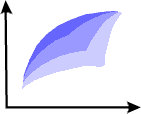Efficient Frontier

William J. Bernstein
Efficient Frontier

William J. Bernstein
![]()
Links of the Month
Streaming Economics
It's nice to attach a face, or at least a voice, to those who influence our thinking. The luxuriant spread of streaming audio and video on the Web has made an increasing amount of material available. A small, superb example is provided by the Webcast of the University of Chicago's celebration of Eugene Fama's 65th birthday, which features delightful talks from the likes of Richard Roll, Robert Merton, and Michael Jensen.
An even larger volume of material is available from the World Bank's B-SPAN lecture series. To name just a few of the luminaries you can hear and see: Jeffrey Sachs, Daniel Yergin, and Raghuram Rajan.
How to Really Listen to Streaming Audio
Watching a Webcast on a 15-inch monitor is not a lot of fun. Even if your home is outfitted with wireless, listening to a good audio while attempting to amuse your dinner guests or while cleaning up the dishes afterward is still not easy.
There is a better way, and once you've mastered it, you'll toss out the radios in your house and car. It's called Total Recorder. (Full disclosure: In case you’re wondering, I have no connection to this product or the company that produces it, High Criteria, aside from the fact that it's the niftiest piece of software I own.)
Total Recorder allows you to convert any streaming audio, including the audio portion of a Webcast, into MP3 format. If you're an NPR buff, that means you can capture any program they’ve produced since they began archiving their output eight years ago. Since it’s archived, you can record it any time you want. The site is even searchable. Want to hear every program by them on Martha Stewart? Can do. Looking for that Niall Ferguson interview you caught snippets of last week while driving home? No problem. The shareware version will record very brief clips, but if you want to use it properly you'll have to pay the princely sum of $11.95 to register for full functionality.Even better, in my opinion, than NPR is BBC Radio 4. While their archiving is not as good as NPR's, their program depth is far greater. Their Listen Again section will allow you to access programs as far back as two years, although many are deleted in as little as a few weeks. (I'm particularly addicted to In Our Time, Thinking Allowed, and Material World.) To paraphrase Samuel Johnson: If you're bored with Radio 4, you're bored with life.
What good is all this stuff? If you spend lots of time commuting by car or on foot or are a compulsive walker/runner, the NPR site is a source of entertainment that can be tailored precisely to your tastes, and Radio 4 is the equivalent of continuous graduate-level material.
Some words of warning: First, Total Recorder is not for computer wusses; it's not at all intuitive. (And, if you’re a Mac enthusiast, sorry; you’re not invited to this party.) Second, you'll have to possess a working knowledge of both RealPlayer and the Windows Media Player. So if you don't know your way around your system, you'd best stay away. Third, while it is theoretically possible to record with a dial-up connection, I don't recommend it.You will need broadband.
I've written a brief set of instructions for getting Total Recorder up and running. Good listening.
Copyright © 2004, William J. Bernstein. All rights reserved.
The right to download, store and/or output any material on this Web site is granted for viewing use only. Material may not be reproduced in any form without the express written permission of William J. Bernstein. Reproduction or editing by any means, mechanical or electronic, in whole or in part, without the express written permission of William J. Bernstein is strictly prohibited. Please read the disclaimer.